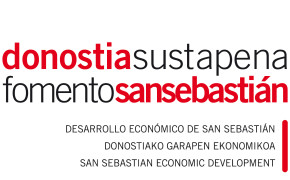Donostia/San Sebastián UP! is the city investment Plan which aims to foster its economic development in an integrated and sustainable way
With this purpose, several measures are designed each year with the main target of creating new jobs, always with the focus that Innovation has to be the engine, the pillar to promote the generation of new companies, the design of new public policies, etc. In summary, it is the city operational tool to strenghten and impulse its economic development.
The 2016 Plan was structured following three main guidelines for the city:
People are the base of every society, and public investments must be channeled to support and enable its development and integration in the jobmarket, strenghtening its Talent and promoting its social cohesion.
The enterprises are a key agent to create employment and contribute to the economic development. This Plan stresses the importance of the companies with more added value, as well as those that have made a bet in the Innovation field. This Plan includes several tailor made programs in order to help enterprises.
The territory, as a concept including neighbourhoods, infrastructures, but also public spaces and equipments as the environment where citizenship and enterprises activity takes place. This is identified as a perfect space to develop SMART projects, which are already taking place such as the REPLICATE project (co-funded by Horizon 2020 and with more than 11 million budget for the city).
Resources needed
The Budget of the Plan reaches 8 million euros.
The 2016 Donosti UP set up the basic framework for the year. It is difficult to calculate the resources used for the design and implementation because it involves nearly all the actions of the organization, and the and the majority of the staff.
Evidence of success
Since 2012 San Sebastián is promoting innovation and talent through the annual Economic Stimulus Plans, investing nearly 32 million euros to promote a smart, sustainable and inclusive development.
These Plans implementation has launched over 1,400 new companies, improved nearly 3500 SMEs innovation capacities and created or maintained over 5,000 jobs.
The public-private cooperation in the design and implementation of these plans has been a key issue to achieve such a results.
Difficulties encountered
The private- public collaboration is key. -The direct funding policy, allowing innovative companies to explore the international markets. -This programme must be “alive”: it is adapted every year to the real needs, identified in close collaboration and feedback with companies and other agents.
Potential for learning or transfer
- The methodological procedure to prepare the city investment plan is a consultation one. More than 70 local partners are requested to identify the most critical needs of the city, to make sure that the strategic investment lines identified will have a real impact and correspond to real needs.
- The collaboration between public and private sector.
- To have a common “brand”.
- The utmost relevance of having a funding package and specific collaboration partnerships.
- The support and endorsement of the institutions, at different levels, to have a broader impact.
- The design and deployment of an intense communication programme, as well as briefing meetings.
Tags: Support, SME, Sustainable, Innovation, Internationalisation








